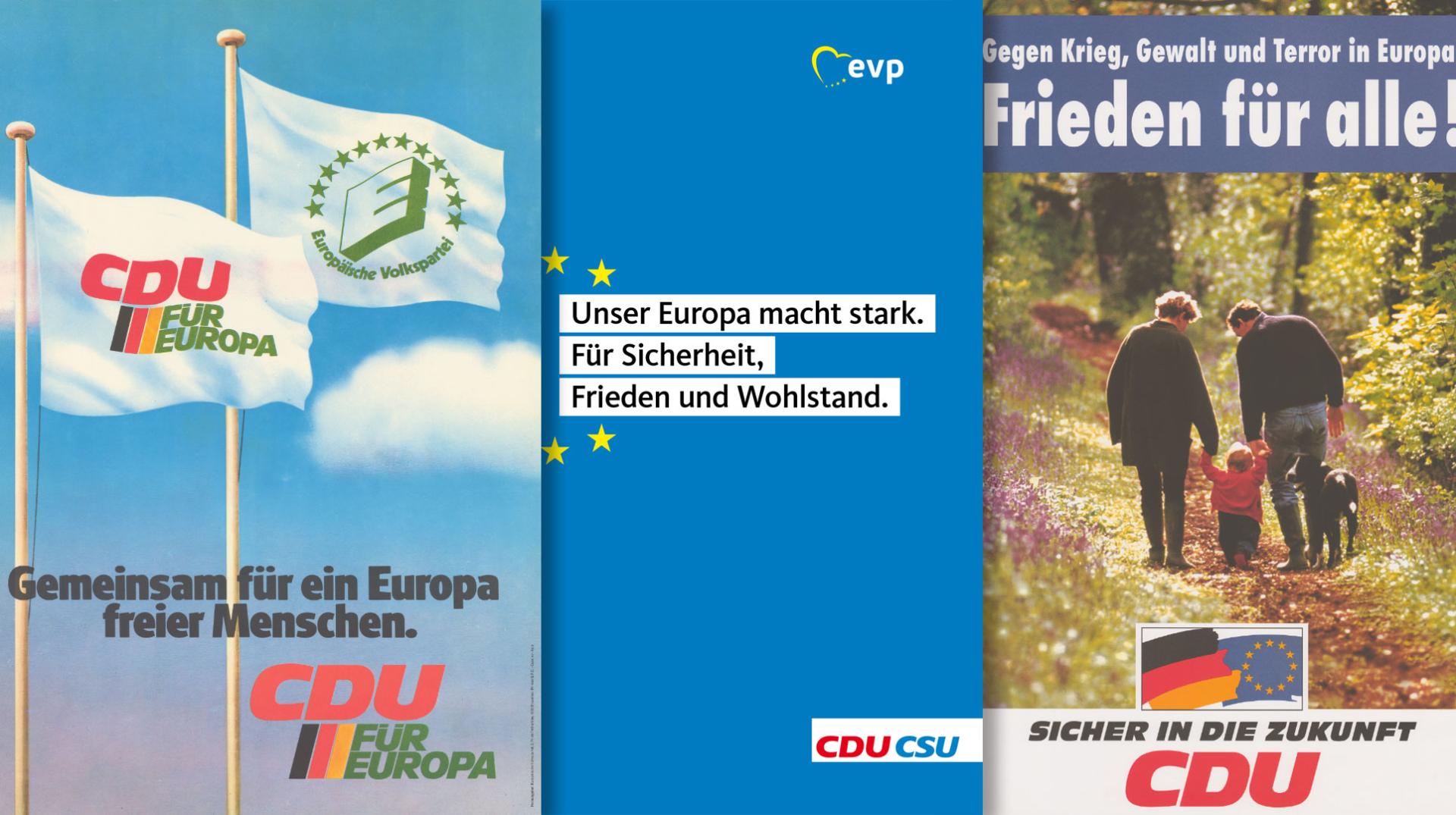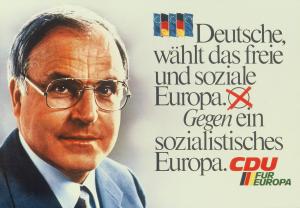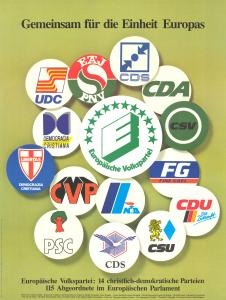Asset Publisher
Research guide: European elections
An overview of the relevant holdings of the Archive of Christian-Democratic Policy (ACDP)
Asset Publisher
“Together for a Europe of free people” - With this call, the European People’s Party (EPP) entered the first direct elections to the European Parliament in 1979. In the following decades, the European Parliament succeeded in significantly expanding its participation rights in the legislative and budgetary procedures of the European Union. The introduction of direct elections and the associated strengthening of the democratic legitimacy of the Parliament paved the way for this increase in importance.
Since then, the citizens of the member states have been electing their representatives every five years. This year, the European parliamentary elections will take place for the tenth time on 06-09 June 2024.
The Archive of Christian-Democratic Policy (ACDP) of the Konrad-Adenauer-Foundation therefore presents a selection of its holdings, which are of central importance for the research of European parliamentarism, on this webpage. Researchers are cordially invited to examine the Christian-Democratic influence on the European integration process in our archive. A small selection of documents, posters and advertising materials can also be found as digital copies on this webpage.
Table of contents
☛ Relevant holdings of the ACDP
☛ Overview with selected sources of the European elections 1979 - 2019
Relevant holdings of the Archive of Christian-Democratic Policy (ACDP)
Archival material on previous European elections can be found in the ACDP in numerous holdings. These are mostly memos, correspondence, and minutes of meetings for the planning of the respective election campaigns as well as post-election analyses. These are supplemented by various types of sources, such as speech manuscripts, election appeals and programmes, press releases, etc. In our poster archive, you can also find an extensive collection of European election posters, which have been made available on Wikimedia under a Creative Commons license.
European Holdings
- The collection 09-001 “CD/EPP Group in the European Parliament” (link to the online finding aid) contains a collection that the group created to document the European integration. It contains extensive materials on the direct elections of the European Parliament.
- The collection 09-007 “European People’s Party” (link to the online finding aid) comprehensively documents the cooperation of the European Christian democratic party family. The documents from the founding phase (from 1976 onwards), especially on the program work for the first direct election in 1979, are of particular relevance for the European elections. For later elections, there are documents here, among others, of the program commission of the EPP and on the election campaign planning in the individual member countries.
- The members of the CDU and CSU form their own group in the EU Parliament, whose documents are archived in the collection 09-010 “CDU/CSU Group in the European Parliament”. Collections of material and documents on co-operation between the campaigners and the CDU federal party are archived here.
National Holdings
- Collection 07-001 “CDU Federal Party” (link to the online finding aid) contains not only sources related to the party leadership and governing bodies, but also the records of the Federal Executive Office. Through these documents, the German CDU’s European election campaigns can be traced in detail.
- In order to prepare for the first European elections, the CDU/CSU parliamentary group in the Bundestag established its own European office, whose records are archived in Collection 08-010 “European Office of the CDU/CSU Parliamentary Group.” These files, spanning until its dissolution in 1995, document the collaboration between the Bundestag (German federal parliament) and the European Parliament, as well as the respective CDU parliamentarians. The office was actively involved in European election campaigns and extensively documented them afterward.
Regional Holdings
The holdings of the CDU state associations provide an insight into the regional European election campaigns. The same applies at the local level to the holdings of the district associations.
Personal Papers
In addition to the papers of the various CDU-branches, the personal holdings of important European politicians, including the files of the former Presidents of the European Parliament Hans Furler, Egon A. Klepsch and Hans-Gert Pöttering, as well as numerous other members of the EP and other European institutions, are also kept in the ACDP.
Nutzungsbedingungen:
The Access to the collections presented here differs. The holdings of the CDU Federal Party (07-001), the European Office of the CDU/CSU Parliamentary Group (08-010), and the regional associations are generally accessible under the usage regulations of the Archive of Christian-Democratic Policy (ACDP) after a protective period of 30 years. Similarly, the records of the CD/EPP Group in the European Parliament (09-001) and the European People’s Party (09-007) are typically accessible after a protective period of 15 years. However, separate access and usage conditions apply to the holdings of the CDU/CSU Group in the European Parliament (09-010) and certain individual collections, which can be inquired about at the ACDP.
Overview with selected sources of the European elections 1979 - 2019
European election 1979
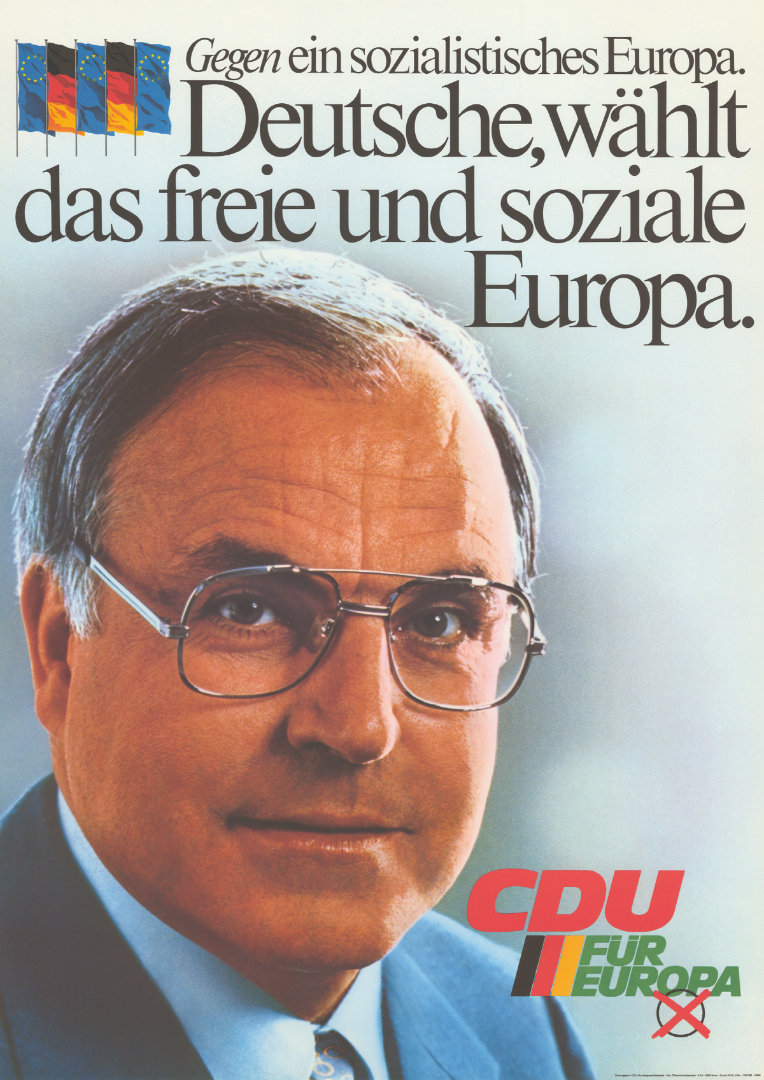 KAS/ACDP, 10-030-1
KAS/ACDP, 10-030-1
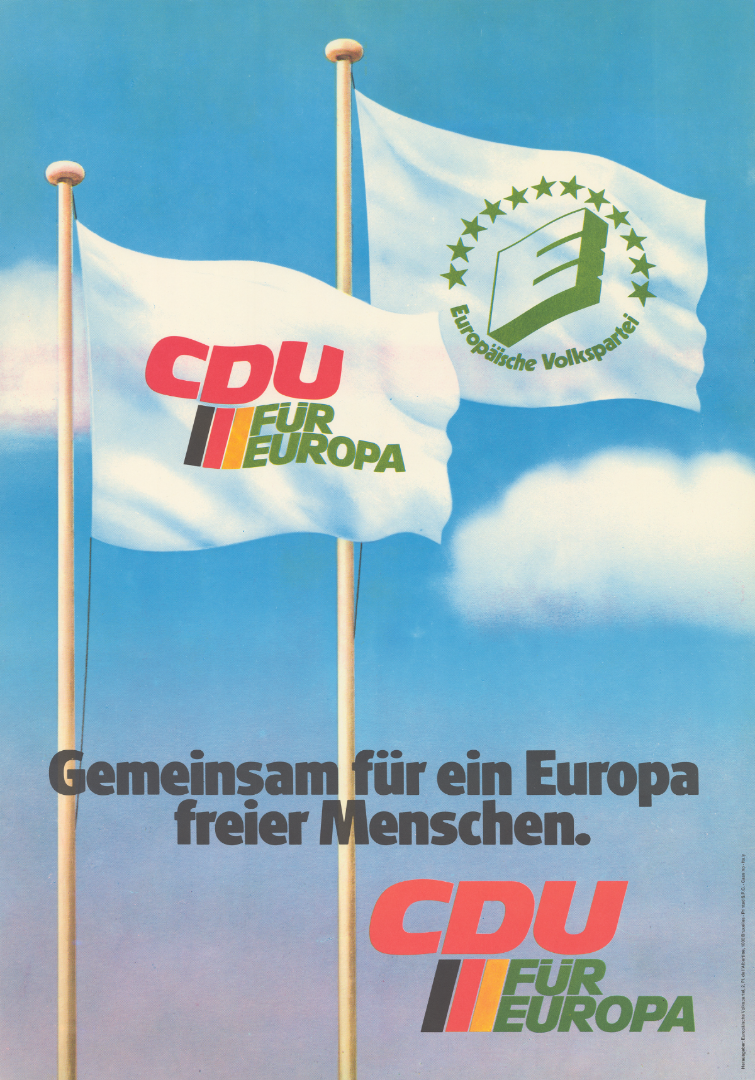 KAS/ACDP, 10-030-8
KAS/ACDP, 10-030-8
 KAS/ACDP, 10-030-1
KAS/ACDP, 10-030-1
 KAS/ACDP, 10-030-8
KAS/ACDP, 10-030-8


The first direct elections of the European Parliament took place in the nine member states of the European Community (EC) between June 7 and 10, 1979. In the Federal Republic of Germany, voter turnout was 65.7%, slightly above the EC-wide average (approximately 62%). Of the 410 members of the new parliament, 81 were allocated to the Federal Republic.
The Christian Democratic Union (CDU) and the Christian Social Union (CSU) received 49.2% of the votes (CDU: 39.1%, CSU: 10.1%), narrowly surpassing the social-liberal coalition led by Helmut Schmidt. Together, they sent 42 representatives to Strasbourg.
In the new parliament, the Socialist Group held the largest number of seats with 112, followed by the European People’s Party (EPP) with 108 seats (including CDU: 34, CSU: 8).
Slogans:
| Germans, vote for a free and social Europe - Against a socialist Europe. CDU for Europe (Original: Deutsche, wählt das freie und soziale Europa - Gegen ein sozialistisches Europa. CDU für Europa) |
| Politics for freedom - happiness for the people. CDU for Europe (Original: Politik für die Freiheit - Glück für die Menschen. CDU für Europa) |
Sources:
European election 1984
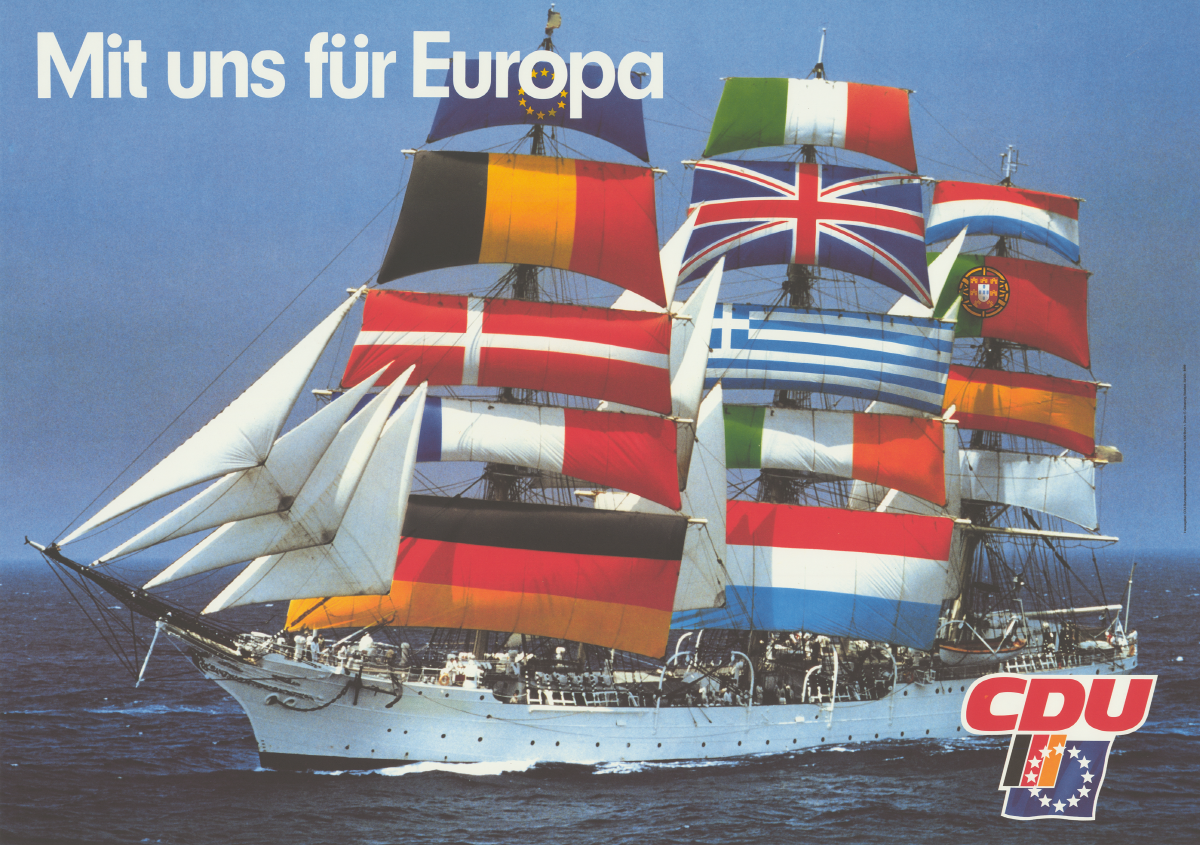 KAS/ACDP, 10-030-100
KAS/ACDP, 10-030-100
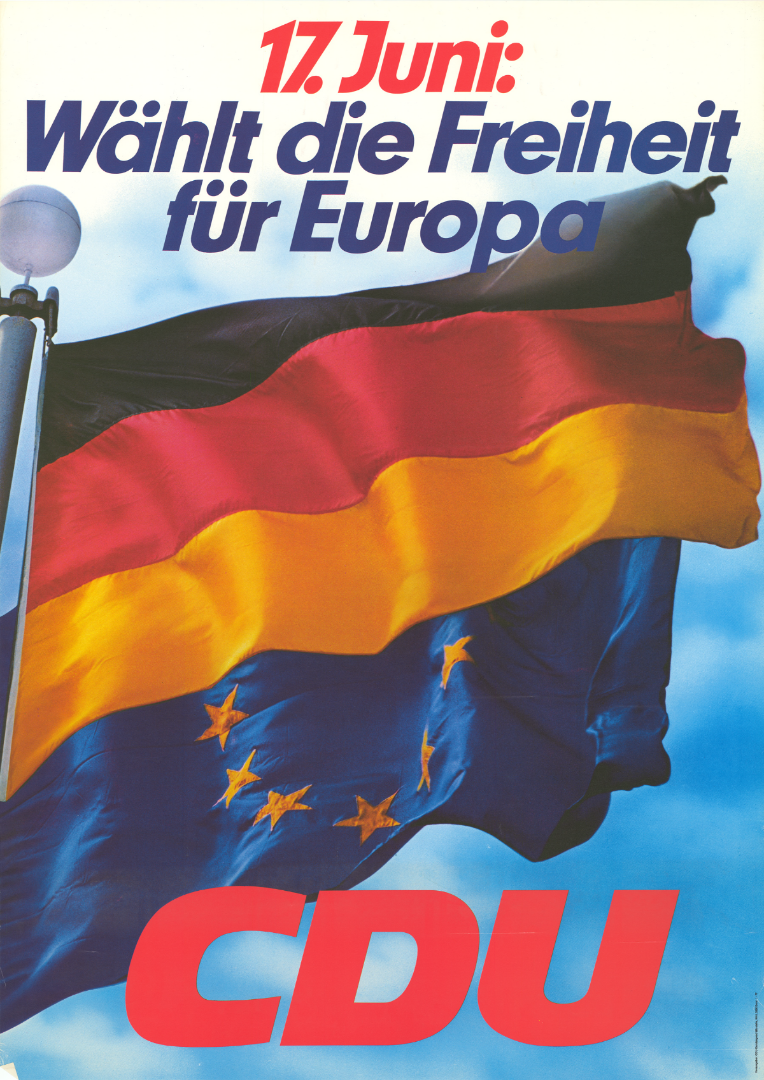 KAS/ACDP, 10-030-138
KAS/ACDP, 10-030-138
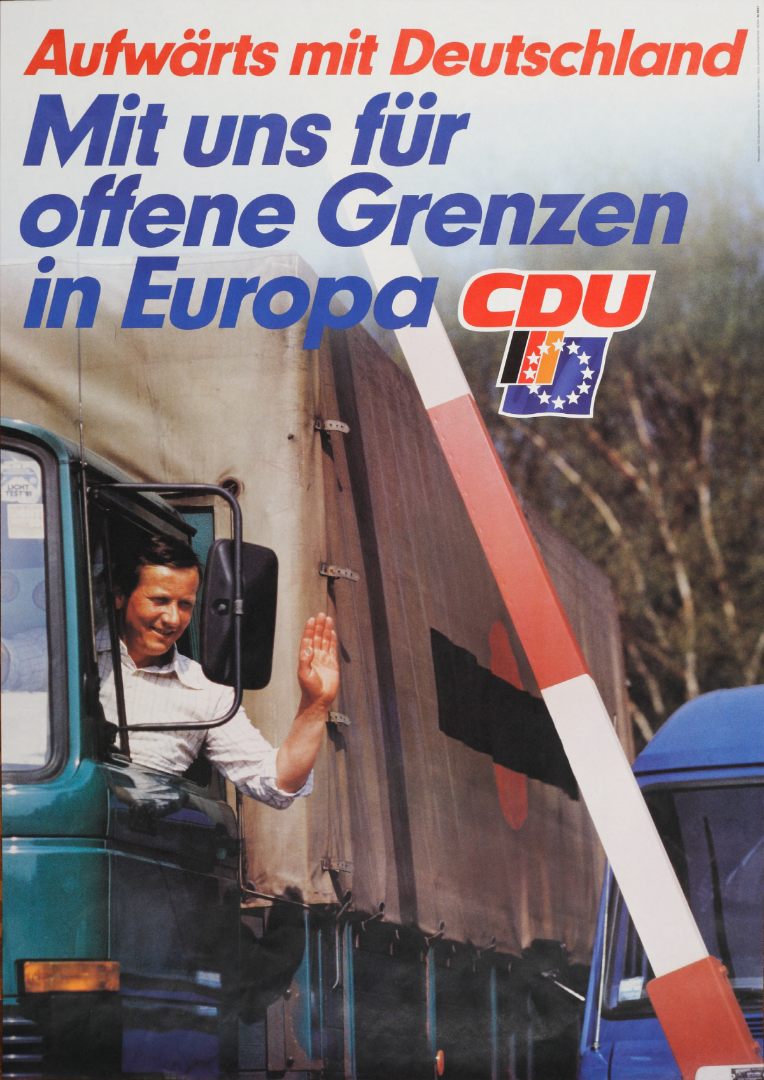 KAS/ACDP, 10-030-141
KAS/ACDP, 10-030-141
 KAS/ACDP, 10-030-100
KAS/ACDP, 10-030-100
 KAS/ACDP, 10-030-138
KAS/ACDP, 10-030-138
 KAS/ACDP, 10-030-141
KAS/ACDP, 10-030-141



The voter turnout for the second elections of the European Parliament, held between June 14 and 17, 1984, declined across Europe to approximately 59%. In Germany, it decreased by nearly nine percentage points to 56.8%. Following Greece’s accession in 1981, the Parliament expanded to 434 seats, with the German share remaining unchanged at 81 seats.
The Christian Democratic Union (CDU) and the Christian Social Union (CSU) together secured 46% of the votes (CDU: 37.5%, CSU: 8.5%). While the Free Democratic Party (FDP) failed to overcome the then-existing five-percent threshold, the Green Party entered the European Parliament for the first time with 8.2% of the vote.
Once again, the Socialist Group emerged as the largest faction in the European Parliament, holding 130 seats, followed by the European People’s Party (EPP) with 110 seats (including CDU: 34, CSU: 7).
Slogans:
| Upwards with Germany. With us for Europe (Original: Aufwärts mit Deutschland. Mit uns für Europa) |
Sources:
European election 1989
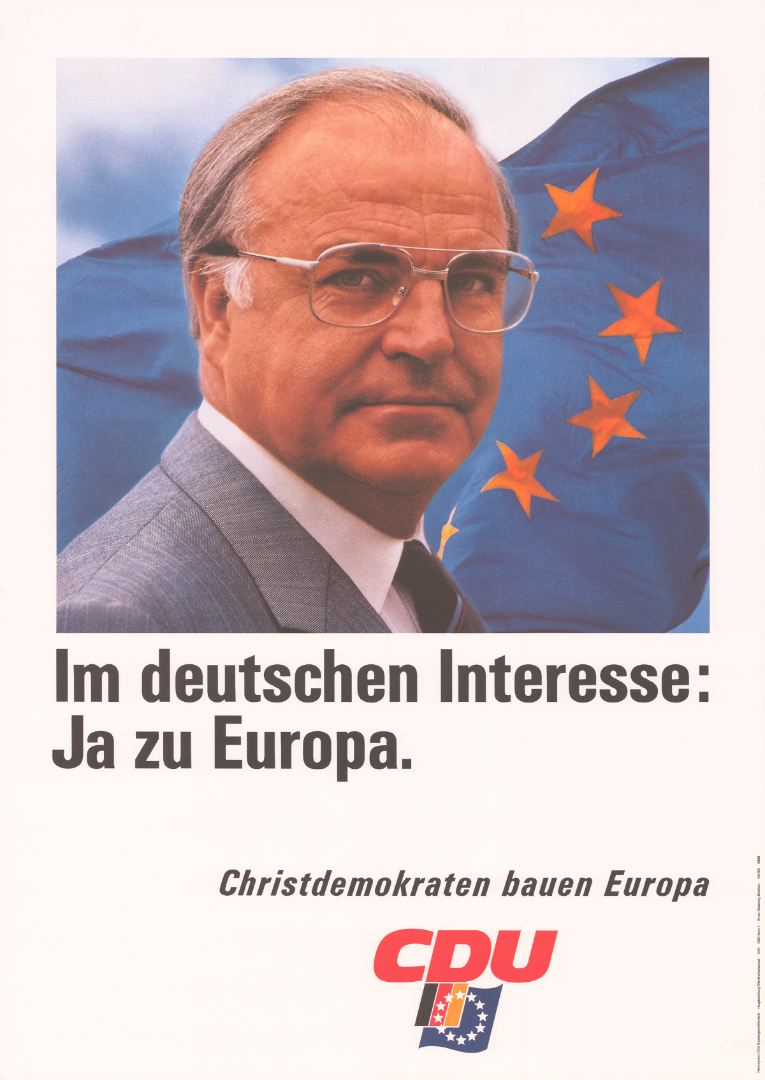 KAS/ACDP, 10-030-200
KAS/ACDP, 10-030-200
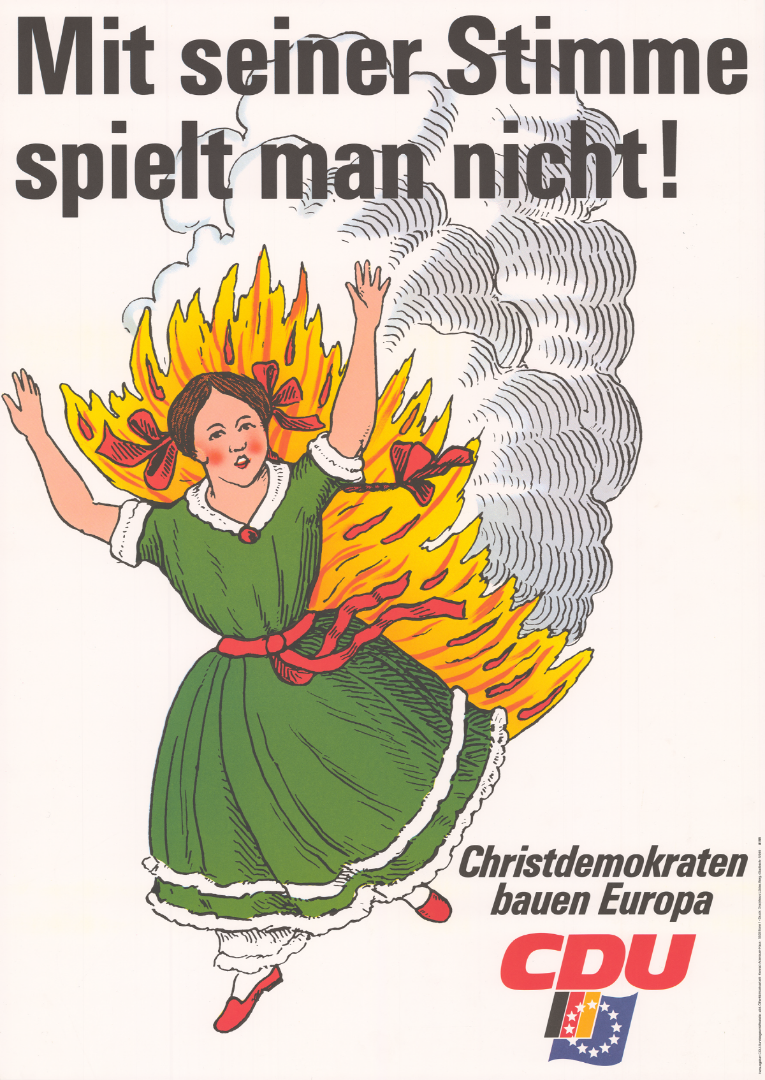 KAS/ACDP, 10-030-205
KAS/ACDP, 10-030-205
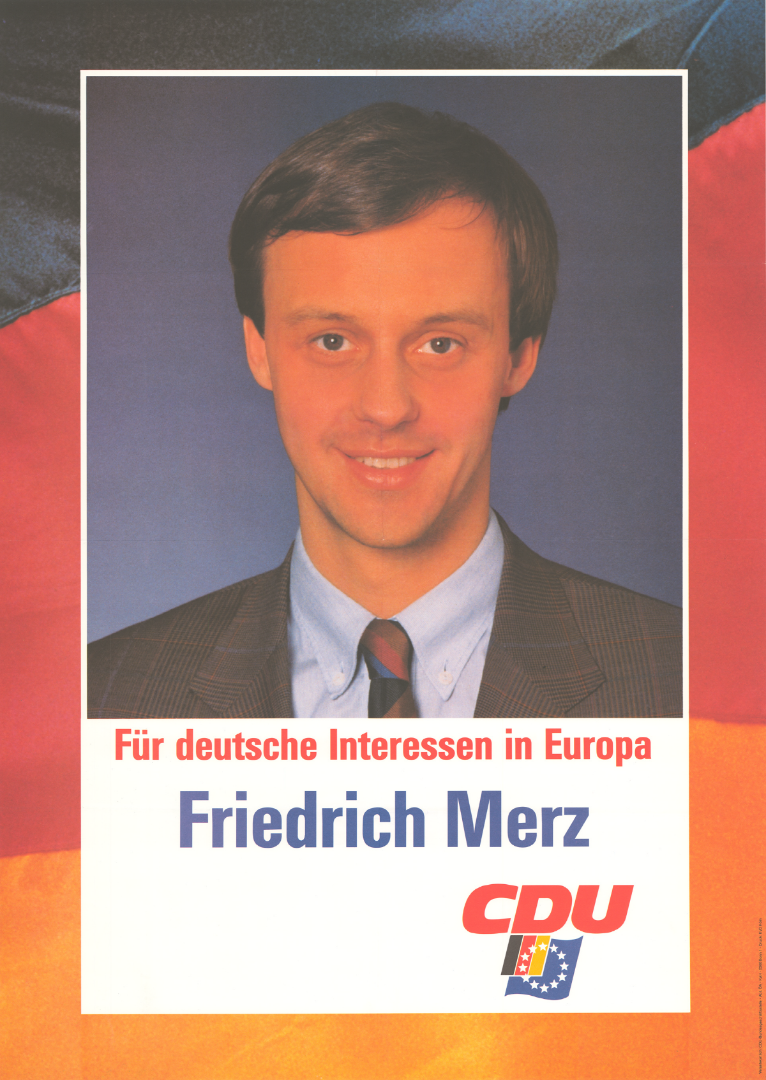 KAS/ACDP, 10-030-229
KAS/ACDP, 10-030-229
 KAS/ACDP, 10-030-200
KAS/ACDP, 10-030-200
 KAS/ACDP, 10-030-205
KAS/ACDP, 10-030-205
 KAS/ACDP, 10-030-229
KAS/ACDP, 10-030-229



During its second legislative period, the European Parliament gained concrete decision-making powers in European legislation with the adoption of the Single European Act in 1987. In the subsequent third direct elections held between June 15 and 18, 1989, voter turnout remained nearly unchanged across Europe at 58.4%, while in the Federal Republic of Germany, it slightly increased to 62.3%. Following the enlargement of the European Community in 1986 to include Spain and Portugal, the number of Members of the European Parliament (MEPs) rose to 518, with 81 still allocated to the Federal Republic.
The Christian Democratic Union (CDU) and the Christian Social Union (CSU) experienced significant vote losses in this election, jointly securing 37.7% of the votes (CDU: 29.5%, CSU: 8.2%). In the German European elections, the far-right party Die Republikaner achieved one of their major electoral successes, entering the European Parliament with 7.1% of the vote and six MEPs.
As before, the Socialist Group remained the largest faction in the European Parliament, holding 180 seats, followed by the European People’s Party (EPP) with 121 seats (including CDU: 25, CSU: 7).
Slogans:
| A clear yes for Europe (Original: Ein klares Ja für Europa) |
| Germany's future is Europe (Original: Deutschlands Zukunft heißt Europa) |
| Radicals and SPD - goodbye future and prosperity (Original: Radikale und SPD - Zukunft und Wohlstand ade) |
| Those who vote for the radical right are governed by the left (Original: Wer rechtsradikal wählt, wird links regiert) |
| Christian Democrats are building Europe (Original: Christdemokraten bauen Europa) |
| In the German interest: Greater Europe (Original: Im deutschen Interesse: Großes Europa) |
| In the German interest: Yes to Europe (Original: Im deutschen Interesse: Ja zu Europa) |
| No experiments: Go vote! (Original: Keine Experimente: Wählen Gehen!) |
Sources:
European election 1994
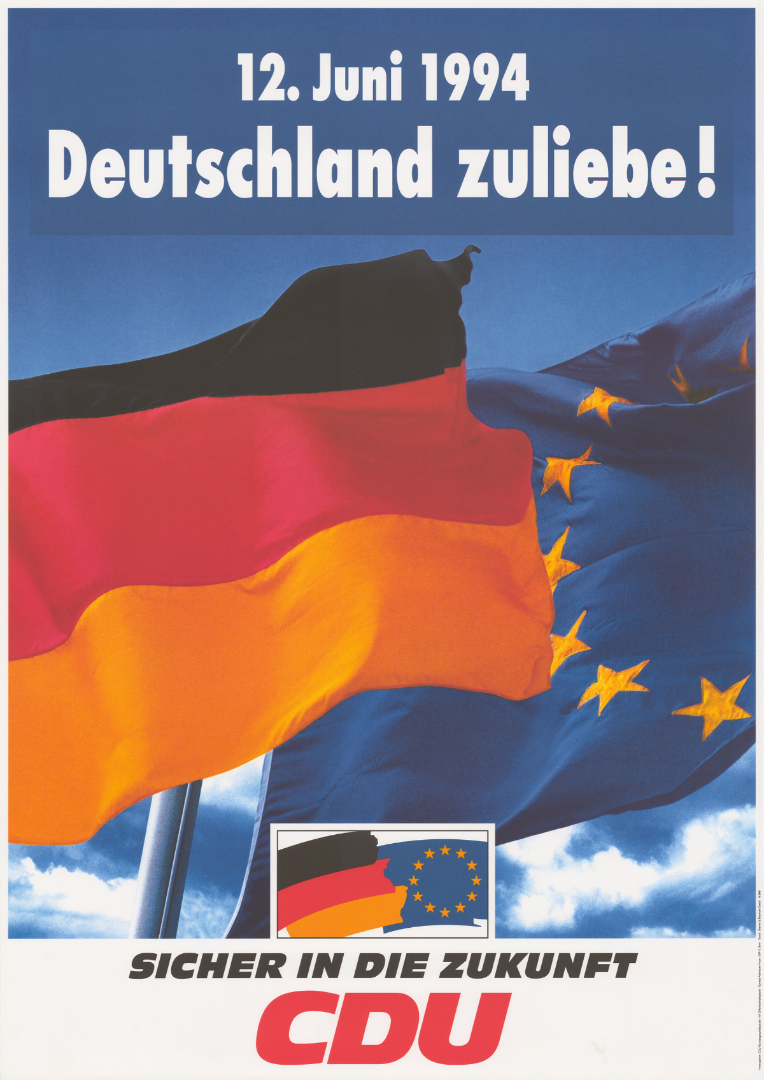 KAS/ACDP, 10-030-501
KAS/ACDP, 10-030-501
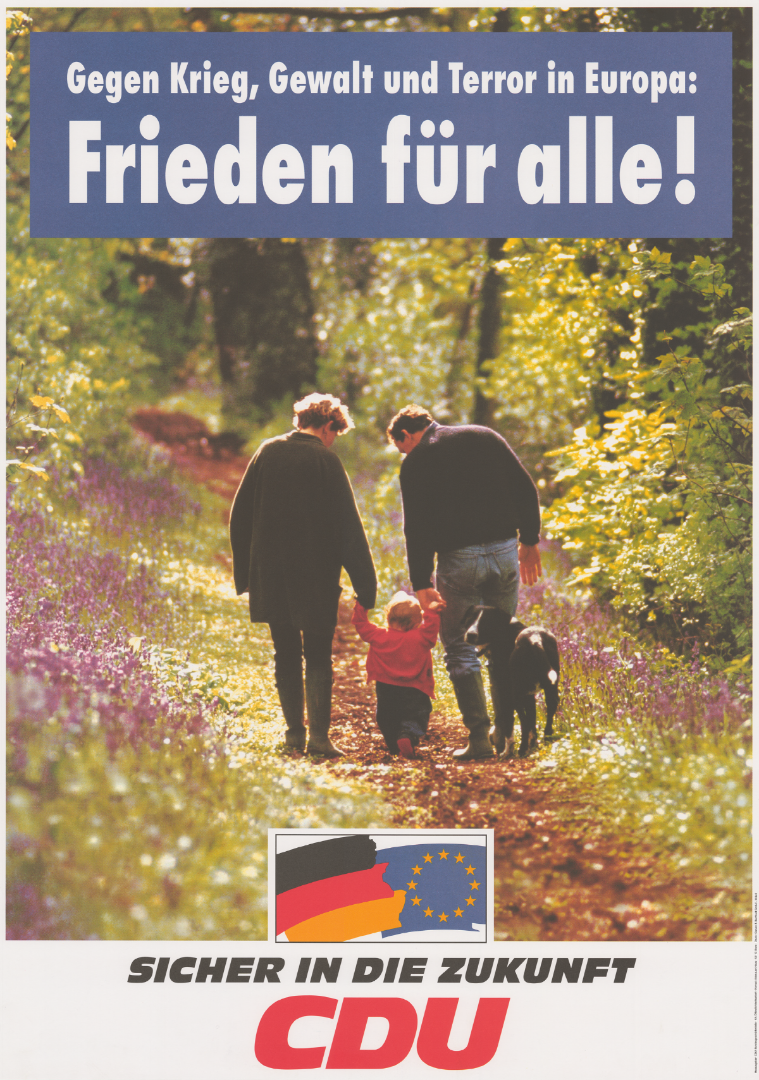 KAS/ACDP, 10-030-502
KAS/ACDP, 10-030-502
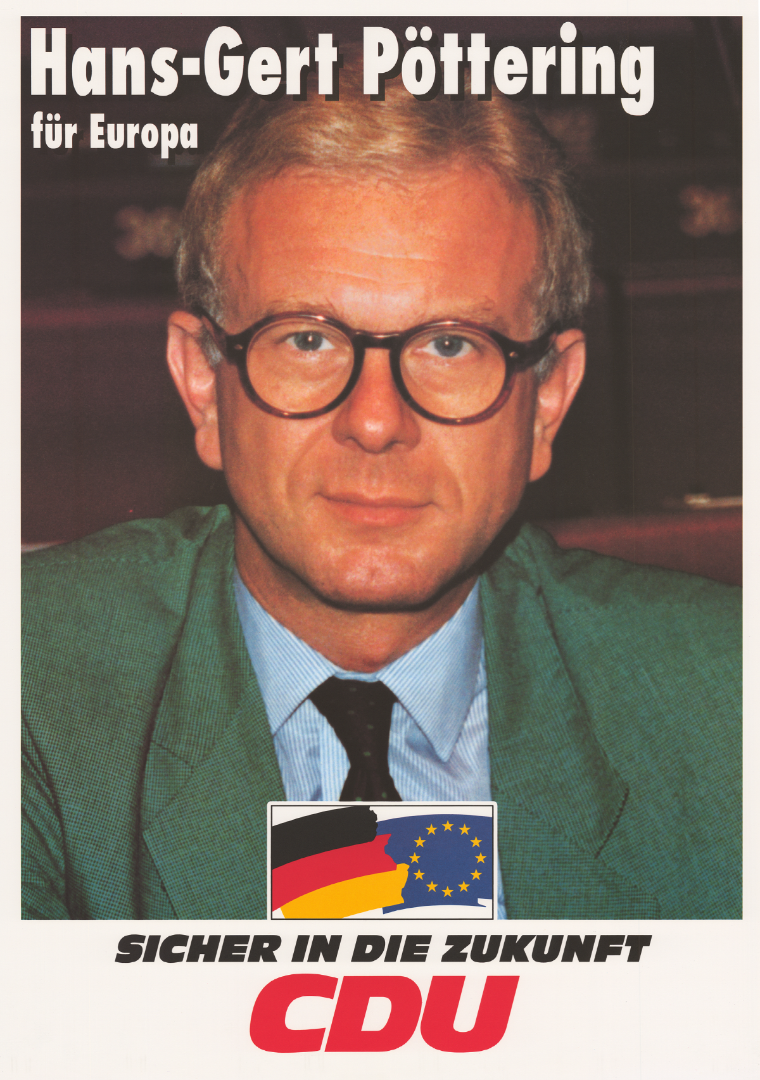 KAS/ACDP, 10-030-514
KAS/ACDP, 10-030-514
 KAS/ACDP, 10-030-501
KAS/ACDP, 10-030-501
 KAS/ACDP, 10-030-502
KAS/ACDP, 10-030-502
 KAS/ACDP, 10-030-514
KAS/ACDP, 10-030-514



After the creation of the European Union through the Maastricht Treaty in 1993, which further strengthened and expanded the Parliament’s decision-making powers, and following the reunification of Germany, the fourth direct elections took place between June 9 and 12, 1994, under completely changed conditions. The composition of the Parliament was adjusted to demographic changes, and the number of Members of the European Parliament (MEPs) was increased to 567, with 99 now allocated to a reunified Germany.
In this election, the Christian Democratic Union (CDU) and the Christian Social Union (CSU) received 38.8% of the votes (CDU: 32%, CSU: 6.8%). Voter turnout in Germany decreased again to 60%, but it still exceeded the EU-wide turnout, which had also declined to 56.7%.
Once again, the Social Democratic Party of Europe (formerly Socialist Group) remained the largest faction with 198 seats, followed by the European People’s Party (EPP) with 156 seats (including CDU: 39, CSU: 8).
Slogan:
| We stand up for Europe (Original: Wir machen uns stark für Europa) |
Sources:
European election 1999
During the European elections held between June 10 and 13, voter turnout declined again, both across the EU (49.5%) and in the Federal Republic of Germany (45.2%), falling for the first time below 50% of eligible voters. The number of Members of the European Parliament (MEPs) increased once again to 626, with 99 allocated to the Federal Republic.
Following the removal of Helmut Kohl in 1998, CDU and CSU jointly received 48.7% of the votes (CDU: 39.3%, CSU: 9.4%).
For the first time, the European People’s Party (EPP) and European Democrats became the largest faction in the Parliament with 232 seats (including CDU: 43, CSU: 10), followed by the Social Democratic Party of Europe with 180 seats.
Slogans:
| Fit for Europe, strong for the future (Original: Fit für Europa, stark für die Zukunft) |
| Europe must be done right (Original: Europa muß man richtig machen) |
Sources:
| 07-001 : 381 | Press release by Angela Merkel, election appeal, 10.06. 1999 |
| 07-001 : 7849 | Resolution from the 12th CDU Party Congress - “Europe Must Be Done Right”, 25.-27.04.1999 |
European election 2004
The European elections took place between June 10 and 13, 2004, just one month after the largest expansion of the EU to include ten predominantly Central and Eastern European countries. Voter turnout declined across the EU to 45.5%, and Germany’s turnout was even lower at 43%. The new allocation of seats in the Parliament, determined during the Nice European Council in 2000, was applied for the first time in 2004, resulting in an increased total of 732 Members of the European Parliament (MEPs), with 99 remaining allocated to the Federal Republic.
In the German European elections, the Christian Democratic Union (CDU) and the Christian Social Union (CSU) emerged victorious with 44.5% of the votes (CDU: 36.5%, CSU: 8%), significantly ahead of the Social Democratic Party (SPD). For the first time, the Party of Democratic Socialism (PDS) secured 6.1% of the votes and 7 MEPs in the European Parliament.
Once again, the largest faction in the European Parliament was the European People’s Party (EPP) and European Democrats, holding 268 seats (including CDU: 40, CSU: 9), followed by the Social Democratic Group with 200 seats.
Slogans:
| Europe 2004 - Germany can do more (Original: Europa 2004 – Deutschland kann mehr) |
| We in Europe - For you in Europe (Original: Wir in Europa – Für Sie in Europa) |
Sources:
|
CDU Federal Executive Committee Resolution, Electoral Manifesto, 22.03.2004 |
|
EPP Electoral Manifesto for the European Parliament Elections 2004, 04.-05.05.2004 |
European election 2009
The European Parliament elections took place between June 4 and 7, 2009, across the 27 member states of the European Union (EU). Voter turnout declined once again, reaching 43% across the EU, while in Germany, it remained at approximately the same level as the previous 2004 elections, with 43.3%. Following the accession of Romania and Bulgaria to the EU in 2007, 736 Members of the European Parliament (MEPs) were elected, with 99 seats allocated to the Federal Republic.
The Christian Democratic Union (CDU) and the Christian Social Union (CSU) jointly received 37.9% of the votes (CDU: 30.7%, CSU: 7.2%). The largest faction in the new Parliament was the European People’s Party (EPP) with 265 seats (including CDU: 34, CSU: 8), followed by the Progressive Alliance of Social Democrats with 184 seats.
Slogan:
| We in Europe (Original: Wir in Europa) |
Sources:
|
CDU Electoral Program for the European Parliament Elections 2009, 16.03.2009 |
| EPP Electoral Manifesto for the European Parliamentary Elections 2009, 29.-30.01.2009 |
European election 2014
In the European Parliament elections held between May 22 and 25, 2014, voter turnout across Europe was similarly low at 42.6%, comparable to the 2009 elections. However, in Germany, voter participation increased for the first time since 1989, reaching 48.1%. The new European Parliament consisted of 751 Members of the European Parliament (MEPs), with Germany contributing 96 seats.
The Christian Democratic Union (CDU) and the Christian Social Union (CSU) together received 35.3% of the votes (CDU: 30%, CSU: 5.3%). Due to a ruling by the Federal Constitutional Court in 2011, which declared the previously applicable five percent threshold unconstitutional, numerous small and minor German parties secured representation in the European Parliament with one MEP each. The Alternative for Germany (AfD), participating in the European elections for the first time, obtained seven percent of the votes, securing seven seats in the new Parliament.
While the European People’s Party (EPP) remained the largest faction in the new Parliament with 182 seats (including CDU: 29, CSU: 5), their proportional share of seats decreased significantly to 24.2%. Conversely, parties with a skeptical or hostile stance toward the European Union gained influence.
Slogans:
| Successful together in Europe (Original: Gemeinsam erfolgreich in Europa) |
| For a Europe that serves the people. (Original: Für ein Europa, das den Menschen dient.) |
| So that Europe strengthens the economy and creates jobs. (Original: Damit Europa die Wirtschaft stärkt und Arbeit schafft.) |
| Good work and a strong economy. That's how I want Europe. (Original: Gute Arbeit und starke Wirtschaft. So will ich Europa.) |
| Security and a stable euro. That's how I want Europe. (Original: Sicherheit und ein stabiler Euro. So will ich Europa.) |
| More opportunities and freedoms. That's how I want Europe. (Original: Mehr Chancen und Freiheiten. So will ich Europa.) |
| So that Europe creates more jobs and growth. (Original: Damit Europa mehr Arbeit und Wachstum schafft.) |
| So that a stable euro helps everyone. (Original: Damit ein stabiler Euro allen hilft.) |
| So that Europe brings opportunities for all. (Original: Damit Europa Chancen für alle bringt.) |
Sources:
European election 2019
The long-term trend of declining voter turnout reversed during the elections held between May 23 and 26, 2019. Across Europe, voter participation increased to 50.7%, while in Germany, it surged from 48.1% (in 2014) to 61.4%. Several events likely contributed to this rise in voter engagement: The United Kingdom’s decision to exit the European Union; The election of Donald Trump in the United States; Europe facing external threats from a revisionist Russia and the rise of EU-sceptical and right-wing extremist parties.
In terms of party results, the Christian Democratic Union (CDU) and the Christian Social Union (CSU) together received 28.9% of the votes (CDU: 22.6%, CSU: 6.3%). Notably, they ran with a joint lead candidate and a shared program for the first time.
In the current Parliament, the European People’s Party (EPP) remains the largest faction with 182 seats (including CDU: 23, CSU: 6). However, both the EPP and the Social Democratic Party (S&D) lost influence. Meanwhile, liberal factions like Renew Europe (108 seats) and Greens/EFA (74 seats) expanded their impact, as did the EU-critical factions Identity and Democracy (73 seats) and European Conservatives and Reformists (62 seats).
Slogan:
| Our Europe makes us strong. For security, peace and prosperity. (Original: Unser Europa macht stark. Für Sicherheit, Frieden und Wohlstand.) |
Sources:
| CDU/CSU Election Program for the European Elections 2019 |
|
EPP Electoral Manifesto for the European Parliamentary Elections 2019 |



